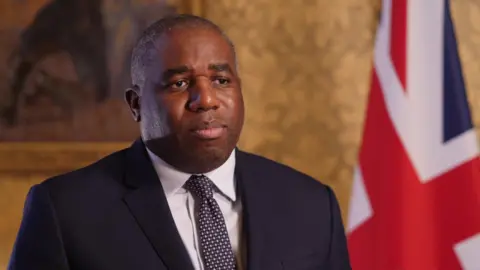UK in diplomatic contact with Syrian rebels, says Lammy
 UK Pool
UK PoolUK Foreign Secretary David Lammy has said the British government has had "diplomatic contact" with the Syrian rebel group that toppled the Assad regime.
Lammy said Hayat Tahrir al-Sham (HTS) remains a proscribed terrorist organisation, but the UK "can have diplomatic contact and so we do have diplomatic contact, as you would expect".
His US counterpart Antony Blinken said on Saturday that the US had made "direct contact" with the HTS rebels now in control of Syria.
Lammy's remarks come as the government announced a £50m humanitarian aid package for vulnerable Syrians, including refugees in the region.
Speaking on Sunday, Lammy said: "We want to see a representative government, an inclusive government. We want to see chemical weapons stockpiles secured, and not used, and we want to ensure that there is not continuing violence.
"For all of those reasons, using all the channels that we have available, and those are diplomatic and of course intelligence-led channels, we seek to deal with HTS where we have to."
The diplomatic contact with HTS does not mean the foreign secretary has personally been in touch with the rebel group.
Whitehall sources say the contact referred to is permitted under the terms of existing terrorism legislation, under which, for example, NGOs would be able to have contact in order to provide humanitarian assistance.
Such contact does not mean that the UK's listing of HTS as a terrorist group is being lifted. But it does indicate that the UK government has embarked on a process of judging HTS on the basis of its actions.
Both the UK and the US have a vested interest in what happens next in Syria. Blinken told reporters on Saturday that the US interaction with HTS was in particular over the fate of the missing American journalist, Austin Tice.
The US State Department said Blinken and Lammy spoke on Sunday, as the secretary of state told the foreign secretary Washington will back "an accountable and representative" government in Syria, "chosen by the Syrian people".
Asked whether HTS could be removed from the UK's list of proscribed terror groups, Lammy said the rebel group remains a proscribed organisation that came out of al-Qaeda.
"Al-Qaeda is responsible for a tremendous loss of life on British soil," Lammy said, adding: "We will judge them [HTS] on their actions, I won't comment on future proscription but of course we recognise that this is an important moment for Syria."
Earlier this week, Prime Minister Sir Keir Starmer said no decision had been made yet on HTS's proscription status.
On the cash pledge to the Middle Eastern country, Lammy said it followed talks on Saturday in Aqaba.
Hosted by Jordan, delegates from several countries agreed on the importance of a "non-sectarian and representative government", protecting human rights, unfettered access for humanitarian aid, the safe destruction of chemical weapons and combatting terrorism.
The talks were attended by the UK, US, France, Germany, the Arab Contact Group, Bahrain, Qatar, Turkey, the United Arab Emirates, the EU and UN.
HTS was not present at the meeting in Jordan.
However, everybody in Aqaba felt it was important to engage with HTS, and that engagement should be on the basis of humanitarian access and the principles outlined above.
The UK said £30m will be channelled within Syria for food, shelter and emergency healthcare, while £10m will go to the World Food Programme (WFP) in Lebanon and £10m to WFP and the UN's refugee agency, UNHCR, in Jordan.
As well as the £50m in aid for Syrians in the region, the UK government said £120,000 of UK funding will be given to support the Organisation of the Prohibition of Chemical Weapons (OPCW) "to rid Syria of chemical weapons" and support the interim Syrian government.
The UK closed its embassy in Damascus in 2013, two years after the Arab Spring protests began to be brutally suppressed there by the Assad regime.
Between 2011 and 2021, more than 30,000 Syrians were granted asylum in the UK, but on Monday the Home Office said it was no longer possible to assess outstanding cases given the change in circumstances.
Last week, the HTS rebel group toppled Assad's rule alongside allied rebel factions.
The Home Office later paused its decisions on Syrian asylum claims to the UK as the government has not determined whether Syria, under the new rebel-led authorities, is a safe country which people could be sent to.
The Assad family ruled Syria for more than 50 years. In 2011, Bashar al-Assad crushed a peaceful, pro-democracy uprising, sparking a civil war in which more than half a million people were killed and 12 million others forced to flee their homes.
More reports are now emerging of the cruelty of Assad's regime and the suffering it inflicted on the lives of so many Syrians.
However, given the Islamist militant group's previous affiliations with al-Qaeda, religious minorities in Syria and neighbouring countries worry about their future under HTS's rule.
